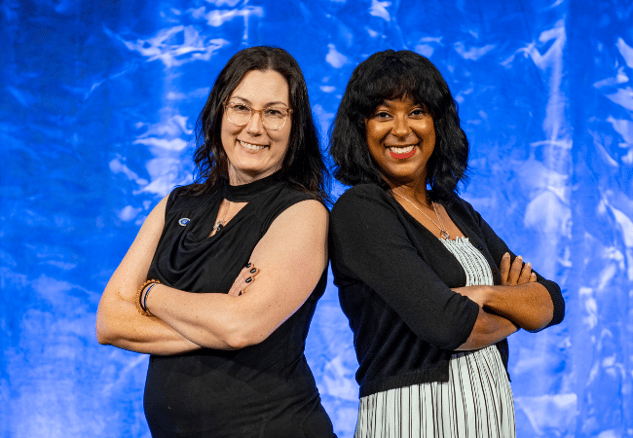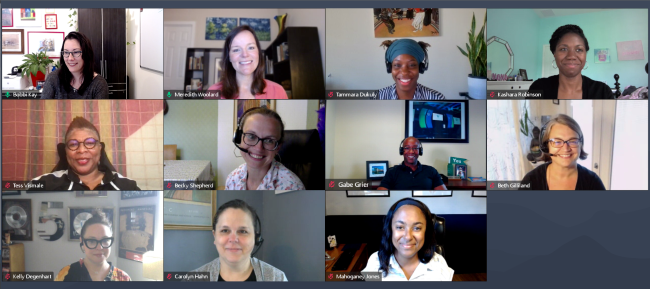Arts and Culture
Article
Insights & Innovation
c4e5f577-6a60-49b4-9768-f3afb2f2be0b
5 min
https://edge.sitecorecloud.io/tessituraneab9a-tessiturane5642-staging-5396/media/Images/Community/TLCC/2022/TLCC-Denver-Using-the-app---768x465.png?h=465&iar=0&w=768
What arts & culture can learn from a digital-first event planner
How to have a digital mindset in an analog industry

President & CEO, Tessitura
How to have a digital mindset in an analog industry
11/9/2022
5 min
Arts and culture was not the only industry to grind to a halt in March 2020.
With lockdowns keeping everyone homebound, the massive conference and event industry suffered similar turmoil. In an instant, event planners were scrambling to figure out how to put on a conference without a conference center.
An outlier to the scramble was the Canadian events management company Event Specialists. Without skipping a beat, they were producing virtual events with polish and elan. As founder and CEO Mahoganey Jones put it, “We didn’t even have to change our website as a result of the pandemic.”

From left to right: Bobbi Kay, Tessitura Director of Member Engagement and Mahoganey Jones, founder and CEO of Event Specialists at TLCC in Denver.
Event Specialists is Tessitura’s conference event partner. In 2021, they helped us produce a fully virtual TLCC, and in 2022 they did the same for a fully in-person TLCC. I recently sat down with Mahoganey to learn their secret to success both online and on-site: digital and analog. As we talked, I realized that the event planning industry has many parallels to arts and culture — and some lessons for us all.
Start with a digital-first mindset
Mahoganey began by explaining that she has always brought a “digital-first mindset” to her event planning work.
For instance, Event Specialists were early adopters of the now-ubiquitous conference apps. They recognized that it made no sense to saddle attendees with reams of paper when the same information could be readily available (and instantly updated) on a smartphone.
“At first, some of our clients were afraid of mobile,” Mahoganey remarked with a chuckle. But having committed, Event Specialists stuck to this approach, sold the benefits, and waited for the industry to catch up.
Always consider digital solutions first.
To Mahoganey, the most important step to succeeding with a digital strategy is simple: always consider digital solutions first.
For the arts & culture sector, the pandemic forced a digital-first mindset on all of us. Organizations moved from in-person to streaming content, replaced physical tickets with mobile delivery, and dispensed with physical concert programs in favor of online ones. As we have returned to in-person experiences, will our sector’s digital-first mindset remain? To keep pace with today’s audience expectations, I think it is imperative on today’s leaders to ensure that it does.
Seeing around corners
Mahoganey had been producing virtual events for more than a decade before the pandemic hit.
I asked Mahoganey how she had managed to predict the rise of virtual events long before most of her colleagues. As she explained, by the mid-2000s the technology existed to produce virtual events, and as a digital-first pioneer, she couldn’t help experimenting with it.
At the time, many in her industry dismissed the idea of virtual, but as she experimented with virtual events, Mahoganey found something exciting. Technology was allowing her clients to reach more attendees and provide levels of access that a physical space couldn’t.
For arts and culture leaders, I would say that “well-informed and curious” are important skills at any time, and doubly so in times of uncertainty.
So was she prescient? Perhaps a bit. But mostly she was well-informed and curious, two traits that led to her sudden success in 2020. For arts and culture leaders, I would say that “well-informed and curious” are important skills at any time, and doubly so in times of uncertainty.
Partners provide lift
While adopting a digital-first mindset and staying well-informed and curious are important precursors to success in a digital world, I wondered how Mahoganey first gained traction with digital events. Mahoganey had a simple answer: she found great digital partners.
For instance, in the conference and events world, A/V companies may be best known for running sound and lights for the keynotes. These same providers often have deep knowledge of recording, streaming and live broadcast technology. Throughout her career, Mahoganey has kept in close touch with current and potential partners and consistently found opportunities to harness their untapped skills to advance her digital portfolio. She also makes sure to find the right solution for the client based on their resources. This guidance helped Tessitura go fully virtual for TLCC in 2021 and return to fully in-person in 2022.

Staff from Event Specialists and Tessitura take part in a pre event rehearsal for TLCC virtual in 2021.
For the arts & culture sector, a digital-first strategy succeeds or fails on the quality of its digital partners, from A/V companies to web developers to customer relationship management providers. We at Tessitura recognize the important role we play here, and work every day to be a terrific partner.
Reduce friction and increase impact
My biggest puzzle for Mahoganey was the paradox that the conference industry shares with arts and culture: How does a digital-first approach fit comfortably in an industry built for in-person connections?
“We look at technology as a way to support — not dictate — the event.”
Her answer was simple: “We look at technology as a way to support — not dictate — the event.” Tools like on-site apps, digital wayfinding, and online session registration reduce friction by streamlining the mundane aspects of a conference. Meanwhile, live captioning, AI-based networking suggestions and digital rosters increase the impact of the conference. In all of these cases, the digital-first approach does just what Mahoganey suggests: supports but doesn’t dictate the event.
For the arts & culture sector, I think this is a near perfect parallel. I posit that nothing can compare to the in-person experience — it is central to the role of culture in our society. However, there can be plenty of friction points on the way to that experience. From ticket purchasing, to entry access, to online donation, there are countless time-consuming tasks standing in the way of the experience. At the same time, technology can also enhance the experience, through intermission pre-ordering, streaming services, or interactive museum guides. At Tessitura, through our own technology and our partners’, we work to reduce the friction points and increase the impact of every experience.
Digital-first pays off
Mahoganey shared that being a digital-first pioneer in an analog industry could be lonely in her first years of promoting the value of a tech focus. Today, she is seeing incredible results from this mindset and tenacity. In 2021, deep in the pandemic, Mahoganey was awarded Canada’s prestigious Event Professional of the Year.
By adopting a digital-first mindset, always being well-informed and curious, and relying on strong digital partners, Event Specialists helps their clients reduce friction and increase the impact of events for their attendees.
A lesson for all of us, and a reminder of why Tessitura is so glad to have Event Specialists in our corner.
Topics
Arts & Culture

Propelling innovation
Arts & Culture / BI & Analytics / Business Strategy / Digital / Technology
Three technology advances driving digital transformation in arts and culture

Debunking four digital transformation myths
Arts & Culture / BI & Analytics / Business Strategy / Digital / Technology
Setting the record straight about common misconceptions
